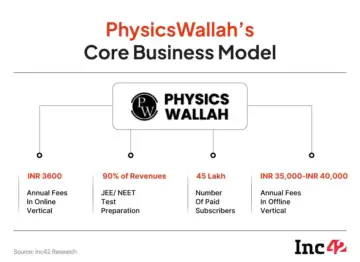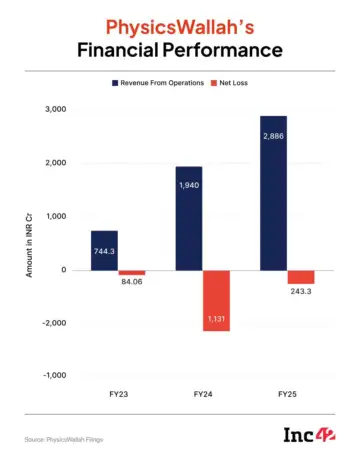What could have been the chemistry behind the union of a socialist and a capitalist as they describe themselves? A shared vision, perhaps, at least going by what Prateek Boob Maheshwari and Alakh Pandey believe to have played behind the making of PhysicsWallah.
Cracking the edtech puzzle in a rapidly evolving market like India is a tough task. The downfall of BYJU’S and a likely fire sale of Unacademy prove the point beyond doubt.
Unlike fintech and ecommerce, edtech has been on a downward spiral ever since the Covid waves ebbed and hybrid learning emerged as a more viable alternative. What added to the momentum was its failure to live up to its promise. After edtech, learning isn’t really inaccessible, but it stayed unaffordable for a larger section of the mass.
“That’s the puzzle we cracked. Nearly 93% of our paid learner base comes from online test prep vertical which has affordability, low-cost product as its core offering,” Maheshwari said in an exclusive interview with Inc42. It is this vision that drove PhysicsWallah to the league of a handful of profitable edtechs.
Not less than 80% of the equity in PhysicsWallah still rests with Maheshwari and Pandey, unlike many new-age internet companies where founders hold low, single-digit stakes. But why? “This helps us stay the course to reach markets that are unserved or underserved by edtech firms and a massive pool of talent remains untapped.”
In fact, PhysicsWallah has become the first edtech company to go public in India, raising INR 3,480 Cr. The IPO comprised fresh shares of INR 3,100 Cr and an OFS component of INR 380 Cr.
While the two cofounders sold a part of their shares, none of the VCs who have so far infused over $200 Mn into PhysicsWallah, diluted their stakes in the $3.6 Bn IPO. The company hopes to be valued at INR 31,500 Cr, at a P/E multiple of 9.5x, after the shares go listed on November 18.
The socialist-capitalist duo, now members of India’s 258 to 384-strong billionaire club, together own stakes worth INR 11,458 Cr in the edtech startup. “We haven’t entered the billionaire club as is being reported now. We were already billionaires. Yet, both of us live in rented houses.”
Maheshwari’s claim of “simple living” resonates with the company squarely focussing on affordable education for the less privileged sections of the society at a fee which is almost 100% cheaper than what their competitors charge.
Pandey, on his part, connects with the audience through his YouTube channel, with 13,943,645 subscribers and 3 Bn views. While Pandey still teaches many batches for free and draws an increasing number of students, Maheshwari perfected the art of monetisation.
Playing The Affordability Card
The company, Maheshwari said, draws nearly 52% of its revenues from online test prep space where students get mentorship, revision, and doubt solving session services. PhysicsWallah’s online test prep space is known as the 3,600 Batch where students are charged INR 3,600 a year for all subjects, which is significantly lesser than its rivals.
“We have 45 Lakh paid learners or students at PhysicsWallah. All the competitors put together do not have even 10% of this paid subscriber base, even though we have been in the business for just five years. Some of our competitors are decades old businesses,” he told Inc42.
According to Maheshwari, PhysicsWallah has built a high-volume learner base from its online vertical simply because it charges minimum fees in this space. “The affordability factor is our huge USP and we are not giving this up. This also makes our TAM as much as 30 Cr learners across multiple exam categories in addition to NEET and JEE.”

Unlike other edtech leaders in this space that have raised billions of dollars from VCs and focussed on just the top 5% addressable markets, PhysicsWallah zeroed in on the remaining 95% and positioned itself as the gateway to top exams for the underprivileged students.
“There are instances like a painter from Kashmir who hails from Anantnag district and became a doctor after enrolling with us. We have students from Mumbai’s Dharavi slums, a mother-daughter duo from the North East and a student who got in the same college from where I did my mechanical engineering – IIT (BHU), Varanasi – and in fact, got through a better better branch of study, computer science,” he said.
“I believe PhysicsWallah showed them the way, but it is the fire in their belly that has made this possible.”
This playbook, according to Maheshwari, is being replicated across multiple exam categories – from CA to UPSC – and it is a purely word-of-mouth business. “This is not a marketing play. It is not a branding play. Like you know, this is, this is very different. Like you know people have approached this sector very differently previously,” he said.
How Doing Things Differently Pays Off
PhysicsWallah doesn’t want to distract its retail and institutional investors with too much noise around new verticals or products announced over the last year and a half. At its core lies the test prep vertical, particularly for the JEE and NEET exams, fetching 90% of its revenue. The company has forayed into upskilling, tech learning, higher education, study abroad, K-12, UPSC or civil services preparation verticals.
“As founders, both Alakh and I devote 100% of our time towards the core test prep space, despite multiple offerings we rolled out in the last few years.” Maheshwari takes pride in the fact that there is no consumer internet company which showed a revenue trajectory like PhysicsWallah.
“Give me the name of one new-age firm that saw a four-fold spike in its revenues and EBITDA over the course of three years,” he said. “There is none.But we crossed that in just five years. Between FY23 and FY25, we grew four times. And when you compare us with the nearest competitors in the education sector, we have grown 20 times more than them.”

Maheshwari said that edtech leaders in the pandemic years raised INR 80,000-90,000 Cr. “We, on the other hand, raised just 2% of the overall edtech sector funding. We have not used the VC funding so far, yet, we have $300 Mn cash in the bank.”
Just as PhysicsWallah was gearing up for the public float, it was mired by a raging controversy with . “Yes, there have been higher cases of attrition in FY24 and FY25 as we also disclosed in our IPO documents. But that is because we also let go off the teachers who received poor ratings from students. Anything below 4, we had let go off. We also hire very aggressively and have a training programme for teachers. Also, we are bringing down our attrition rate,” the cofounder said.
According to its IPO disclosures, PhysicsWallah saw a high attrition rate of 40% in FY24, which moderated to 26.98% in FY25, despite the workforce expanding from 3,654 to 5,096 faculty members.
Most edtech brands in India spend 30-40% of their revenues on marketing, but PhysicsWallah built the business on Pandey’s thesis of community building. His humble background helped shape this model that resonated with a wider market.
PhysicsWallah is also growing its offline test prep business fast. An edtech firm focussed on the top 5% of the market typically charges INR 80,000 a year, despite more than 10 players following the same pricing strategy. “We charge 30-40% less than them in the offline space,” he claimed.
Although PhysicsWallah opened 170 centres over the last three years, there is still room to expand this to 400 centres. “We are number 5 in the offline test prep space. We hold only 7% of offline market share, while 93% still lies with the competition. And this is where the growth will be focussed on. At the same time, the company is on a path to improve the ARPU (average revenue per user) in the offline space,” Maheshwari said.
Decoding Branding And Valuation
Which one is bigger – Brand Alakh Pandey or Brand PhysicsWallah? The confusion becomes more relevant as the company tries to with its public float.
It is Pandey’s community building exercise that showed the edtech startup the way to aggressive growth that eventually propelled the brand to greater heights.
A Google trend graph for the past one year using keywords Alakh Pandey with PhysicsWallah on the search tab shows that the search volume of PhysicsWallah is 100 times more. “While Alakh has undoubtedly been the face of a brand, we have put a conscious effort supported by our teachers to lift the PW brand,” Maheshwari said.
“We don’t shy away from admitting that we are a face-led brand, while we’re also a teacher-led brand. But, at the same time, data speaks very differently. The PW brand is 100 times stronger than Alakh as a personal brand.”
As the edtech brand looks at a post-listing valuation of INR 31,500 Cr, PhysicsWallah finds itself in a unique position. It’s lonely at the top, it feels. Unlike many new-age companies, it doesn’t have a nearest rival to compare its pricing, especially when the valuation of internet companies like Lenskart came under scanner.
“Our valuation jump is merely 30% from the last funding round, even though the revenue has grown multifold. We aren’t pricing PhysicsWallah at even half the price other new-age companies are listing at. We are leaving a lot of value for investors at the table. At the same time, none of our VC investors are cashing out. I think this might be the only IPO in India where none of the VCs are selling their shares. Why? Because they see a lot of potential in this company,” he said.
In the anchor round, PhysicsWallah saw the likes of ICICI Prudential, Motilal Oswal, 360 ONE Assets, Aditya Birla Sun Life, and Edelweiss . When Inc42 asked the founder if the issue was priced modestly, Maheshwari affirmed that they wanted retail investors to hold value by buying their shares. But, as of November 12, from retail, Institutional and non-institutional investors until PhysicsWallah closed for bids with a for 33 Cr shares as against 18 Cr on the block.
India, the home to 1.45 Bn people with an average age of 28.8 years, boasts of a literacy rate of around 81%. Yet, unemployment continues to be a nagging pain in the world’s fastest-growing economy. PhysicsWallah tries to bridge the gap between the dream career and the distressed reality for an unprivileged youth by opening the door to affordable education accessible to a larger cross-section of people.
“We foster a collective movement for a shared dream towards a developed India,” summed up PhysicsWallah cofounder Maheshwari.
